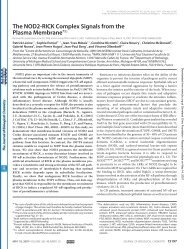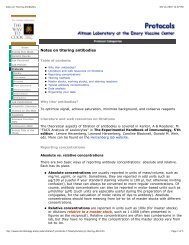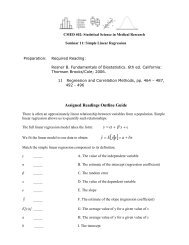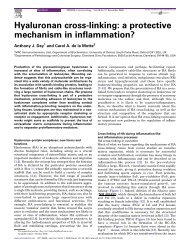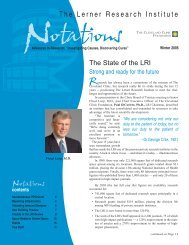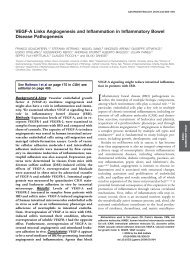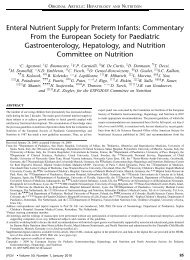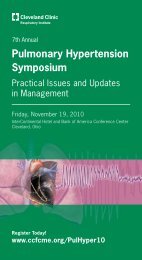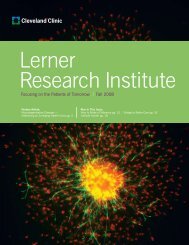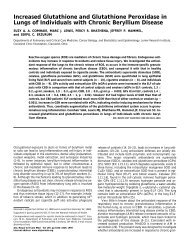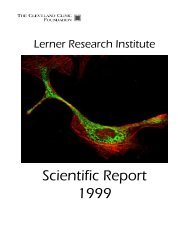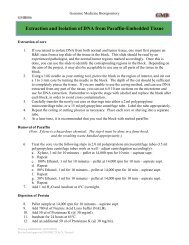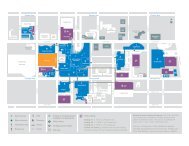Scientific Report 2003-2004 - Cleveland Clinic Lerner Research ...
Scientific Report 2003-2004 - Cleveland Clinic Lerner Research ...
Scientific Report 2003-2004 - Cleveland Clinic Lerner Research ...
- No tags were found...
Create successful ePaper yourself
Turn your PDF publications into a flip-book with our unique Google optimized e-Paper software.
The Department of ImmunologyTumor-induced Apoptosis of T-Cells;A Mechanism of Tumor EvasionTHE FINKELABORATORYRESEARCH SCIENTISTCharles S. Tannenbaum, Ph.D.Depressed T-cell function, resulting inineffective anti-tumor responses, iscommon among cancer patients. Thetumor microenvironment has a deleterious effecton tumor-infiltrating lymphocytes (TILs), althoughthe immunosuppressive effects extend into theperiphery as well. TILs from patients with renal cellcarcinoma (RCC) are impaired in their ability toproliferate and mediate anti-tumor cytotoxicactivity.We hypothesize that tumors evade theimmune system by inhibiting TIL signal transductionand increasing T cells’sensitivity to apoptosis. Thisincreased sensitivity may bea barrier to the developmentof an effectiveimmune response to tumors.This idea is supported byour observation that inapproximately half of RCCtumors, as many as 5-15%of the TILs are apoptotic insitu. Even T cells within thetumor bed that appear viableare actually compromised, asthey are easily induced toundergo activation-inducedcell death (AICD) ifstimulated in vitro. Peripheralblood T cells isolated from RCC patients are alsosusceptible to AICD, suggesting that tumor-derivedproducts can trigger the heightened T-cell susceptibilityto apoptosis and AICD. Indeed, solubleproducts from approximately 50% of explanted, invitro cultured renal tumors directly induce apoptosisof T cells, whereas supernatants from other RCCtumors sensitize T cells to AICD.Our recent findings implicate gangliosideswithin the tumor supernatants as one class ofproducts that can induce both phenotypes in Tcells. Gangliosides isolated from some RCCsupernatants induce apoptosis; those from otherRCC supernatants only sensitize T cells to AICD.Aldehyde products of fatty acid oxidation, likelyresulting from oxidative stress within the tumormicroenvironment, represent another class ofproducts within tumor supernatants that caninduce apoptosis in T cells. Among the mostprominent aldehyde product is 4-hydroxynonenal(HNE). We are testing whether the heterogeneouscapacity of RCC to directly induce apoptosis of Tcells, or sensitize them to AICD, is related to thevariations in the specific products expressed byindividual tumors. We are also testing if specificstructural features of these molecules dictatewhether individual products induce apoptosis orsensitize T cells to AICD. Another major goal is todefine the mechanism by which gangliosides andHNE sensitize and/or induce apoptosis in T cells.James H. Finke, Ph.D.Gangliosides, as well as HNE, can alsoinhibit activation of the transcription factorNFkB. The ability of these products to inhibitNFkB activity may increase the sensitivity of Tcells to apoptosis, since NFkB regulates transcriptionof several key anti-apoptotic genes (Bfl-A1,Bcl-2, XIAP, cIAP1 and cIAP2). Impairment inNFkB activation resulting in reduced expression ofanti-apoptotic genes and increased sensitivity toapoptosis may hinder the development of T-cellimmunity in cancer patients. Studies are under wayto define how tumor-derived products inhibitNFkB activation and how thisaffects the expression of antiapoptoticgenes.We are also testing if thereis cooperation between gangliosidesand death-receptor ligandsexpressed on tumor cells ininitiating T-cell apoptosis. Wefound that in the absence ofcaspase-8 and FADD, Jurkat Tcells are significantly protectedfrom SK-RC-45-mediatedapoptosis. Blocking gangliosidesynthesis with SK-RC-45 alsosignificantly reduced that line’sability to induce T-cell apoptosis.These findings and others suggestthat SK-RC-45-mediatedapoptosis of T cells involves both receptor ligandsand gangliosides expressed by the tumor. Experimentsare in progress to examine the interactionbetween gangliosides and death ligands in promotingT-cell apoptosis.Studies to elucidate the mechanismsresponsible for these abnormalities may facilitatethe future development of new strategies to blockor bypass these signaling defects and restore antitumorT- cell immunity.RESIDENTGeath Al-Atrash, M.D., Ph.D.Dept. of Internal Medicine, CCFPOSTDOCTORAL FELLOWSJustin Albani, M.D.Ithaar Derweesh, M.D.Gira Raval, Ph.D.TECHNICAL ASSOCIATESPatricia A. Rayman, M.S.Cynthia Combs, B.S.Christina Moon, B.S.Amy Richmond, B.S.Mark Thornton, B.S.COLLABORATORSRonald M. Bukowski, M.D. 1Inderbir Gill, M.D. 2Eric D. Hsi, M.D. 3Andrew C. Novick, M.D. 3Walter Storkus, Ph.D. 41Experimental Therapeutics,Taussig Cancer Ctr., CCF2Urological Inst., CCF3Dept. of <strong>Clinic</strong>al Pathology, CCF4Univ. of Pittsburgh, Pittsburgh, PAUzzo, R., Rayman, P., Kolenko, V., Clark, P.E., Cathcart, M.K., Bloom, T., Novick, A.C.,Bukowski, R.M., Hamilton, T. and J.H. Finke (1999) Renal cell carcinoma-derivedgangliosides suppress nuclear factor-kB activation in T cells. J. Clin. Invest. 104:769-776.Finke, J.H., Rayman, P., George, R., Uzzo, R., Tannenbaum, C.S., Kolenko, V., Novick,A.C., and R.M. Bukowski (2001) Tumor induced sensitivity to apoptosis in T cells frompatients with renal cell carcinoma: role of NFkB suppression suppression. Clin. CancerRes. 7(3 suppl.):940s-946s.Tatsumi, T., Kierstead, L.S., Ranieri, E., Gesualdo, L., Schena, F.P., Finke, J.H.,Bukowski, R.M., Mueller-Berghaus, J., Kirkwood, J.M., Kwok, W.W., and W.J. Storkus(<strong>2003</strong>) Disease-associated bias in T helper type 1 (Th1)/Th2 CD4+ T cell responsesagainst MAGE-6 in HLA-DRB1*0401+ patients with renal cell carcinoma or melanoma. JExp. Med. 196:619-628.Kudo, D., Rayman, P., Horton, C., Cathcart, M., Bukowski, R.M., Thornton, M.,Tannenbaum, C., and J.H. Finke (<strong>2003</strong>) Gangliosides expressed by the renal cellcarcinoma cell line SK-RC-45 are involved in tumor-induced apoptosis of T cells. CancerRes. 63:1676-1683.Molto L, Rayman P, Paszkiewicz-Kozik E, Thornton M, Reese L, Thomas JC, Das T,Bukowski R, Finke J and Tannenbaum C. The Bcl-2 transgene protects T cells fromRCC-mediated apoptosis. (<strong>2003</strong>) <strong>Clinic</strong>al Cancer <strong>Research</strong>, accepted.91



